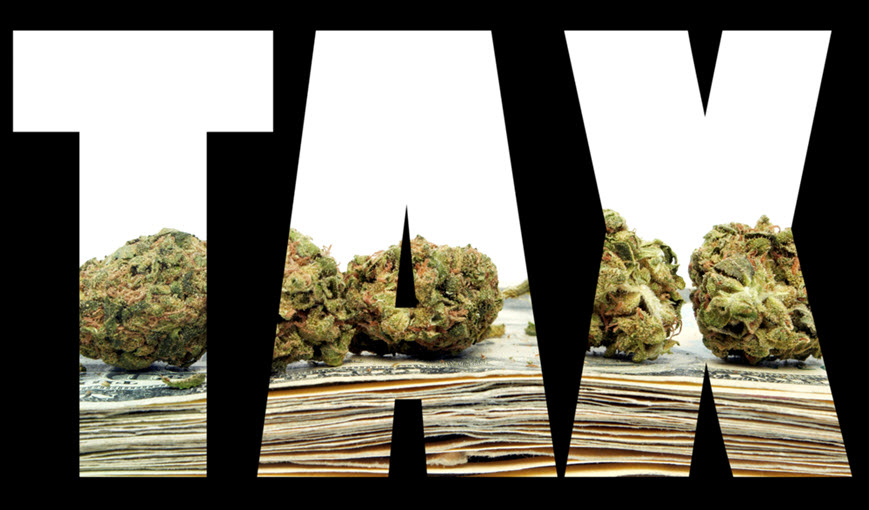
Cannabis Market Crash Fallout – Cities and communities brace for falling tax revenues from weed sales
The expected drop in tax revenue from cannabis sales in cities like San Diego is a concern for city officials, who are bracing for a significant budget cut. As California’s regulated marijuana market faces numerous challenges, including illegal delivery services, San Diego forecasts a significant revenue shortfall.
In fact, officials are forecasting a 23% decline in cannabis tax revenue for the current fiscal year, resulting in $19.8 million instead of the expected $25.7 million. The decline in sales is primarily due to the thriving black market, which is believed to make up about 50% of the local cannabis industry.
According to Phil Rath, executive director of the United Medical Marijuana Coalition, the legal marijuana industry is currently facing stiff competition from its illegal counterpart. As a trade group that represents a variety of marijuana dispensaries, Rath claims delivery services are an ongoing and ongoing roadblock for the city. The San Diego Union Tribune echoes this sentiment, highlighting the difficulties local authorities face in enforcing regulations and curbing the influence of black market operators.
Additionally, falling tax revenues in San Diego point to a larger problem permeating the state of California. After nearly seven years since its legalization, the legal cannabis market has stalled, causing major setbacks for the industry.
According to a Politico report in November, tax revenues from state-sanctioned and regulated marijuana markets took a serious hit, falling nearly $100 million in the third quarter compared to the same period last year. The licensed retailers operating within the state lag far behind the huge underground market, which is estimated to be worth a whopping $8 billion. Despite the significant drop in tax revenue, sales of medical and recreational marijuana in California are forecast to increase through 2021. However, sales have been steadily declining, falling from a peak of over $1.5 billion in Q2 2020.
Data released by California’s Internal Revenue Service and Office of Fees Administration in July, August and September showed that residents in the state had purchased $1.27 billion worth of licensed cannabis products, resulting in $128 million in sales tax revenue led. While still significant, it represented a decrease of $18 million from the previous quarter and a decrease of $52 million from the record high.
California’s black market is dealing a serious blow to its legal cannabis industry.
According to a separate Politico report the same month, California’s black market has dealt a significant blow to its legal cannabis industry, with unregulated sales overshadowing its legal counterpart. Although it’s been six years since the vote to legalize recreational marijuana, the state hasn’t been able to bring the illicit sale under control. The overwhelming demand for marijuana products has caused many legitimate businesses to shut down.
The success of the legal cannabis industry in the country’s most populous state has been hampered by a combination of factors, including high taxes, local government opposition and cut-throat competition from the underground market. Politico points out that exorbitant taxes on cannabis products have resulted in inflated prices that have made them unaffordable for many consumers. Additionally, the reluctance of several local authorities to allow legal pharmacies to open has further hampered the growth of the industry.
In a bid to revive the faltering legal cannabis industry, California lawmakers and officials have been exploring a variety of measures.
Recently, the state’s Democratic lawmakers introduced legislation that would allow licensed cannabis consumption lounges to serve food and beverages, potentially giving small cannabis businesses a much-needed boost as they grapple with numerous challenges. According to Rep. Matt Haney, who supports the proposed law, California’s small cannabis businesses face significant problems due to a variety of issues, including excessive taxes, market saturation and the thriving black market.
These factors have severely hampered the legal operators who abide by the rules and regulations set by the authorities. The introduction of the bill could offer a viable solution to these problems and potentially help level the playing field for the licensed cannabis industry.
San Diego officials not only downgraded their forecasts for fiscal-year cannabis tax revenue, they also revised their long-term projections. Cannabis tax revenue is expected to fund dispensary enforcement and a novel cannabis stock program to help people of color break into the industry.
According to the Union Tribune, officials acknowledged that the cannabis industry was badly affected by the War on Drugs. Previous long-term estimates for cannabis tax revenue, projected just over a year ago, were $31.5 million in fiscal 2025, $33.3 million in fiscal 2026, and $33.8 million in fiscal 2025 However, revised estimates as of November 2022 were much lower, with projected revenues of $26 million for fiscal 2025, $28.4 million for fiscal 2026, and $28.9 million for fiscal 2027, officials said expressed their need for more confidence in the revised forecasts.
Five states saw cannabis tax revenue decrease in 2022
A new report from the Urban Institute & Brookings Institution shows that the five states with the longest histories of legalizing and taxing marijuana sales saw lower tax revenues from the sale of cannabis products in 2022.
Colorado saw the largest fall in tax revenue, down 13.9 percent, resulting in a $56.9 million loss in revenue. The other states that saw declines were California, Nevada, Oregon and Washington, with more modest declines ranging from 3.5 percent to 6.8 percent. The report analyzed cannabis tax policies across the country to reach its conclusions.
The study’s authors noted that tax revenues in Colorado and Washington have increased steadily since 2015, and the cause of last year’s decline is unclear. However, they speculated that it could be related to the pandemic. The COVID-19 pandemic and the federal government’s response to it impacted all aspects of state and local finances in fiscal years 2021 and 2022. The authors suggest that the increase in cannabis tax receipts in 2021 may be due to consumers having disposable income from stimulus checks, reduced spending opportunities, and a desire to fuel marijuana purchases through more public activities such as visiting a bar or restaurant substitute. The drop in cannabis tax revenues in 2022 could mean a return to more normal patterns of use.
The report also highlighted that in some states, the selling price of marijuana fell over the same period, impacting tax revenues and indicating a healthy market. This suggests that states with recently introduced cannabis taxes could experience similar fluctuations in their annual cannabis tax revenue over the course of the market, the report added.
Diploma
The decline in tax revenues from the sale of cannabis products in several states, as highlighted in the latest Urban Institute & Brookings Institution report, is a cause for concern. However, lawmakers and officials across the country are seeking solutions to bolster the legal cannabis market, including enacting legislation allowing licensed consumption lounges to serve food and beverages and implementing programs aimed at supporting small cannabis businesses and to promote fairness in the industry . As the market continues to evolve, it remains to be seen how these efforts will impact the industry in the years to come.
TAX REVENUE COMING, READ MORE…

74% OF CANNABIS SALES IN CALIFORNIA ARE BLACK MARKET?

Post a comment: